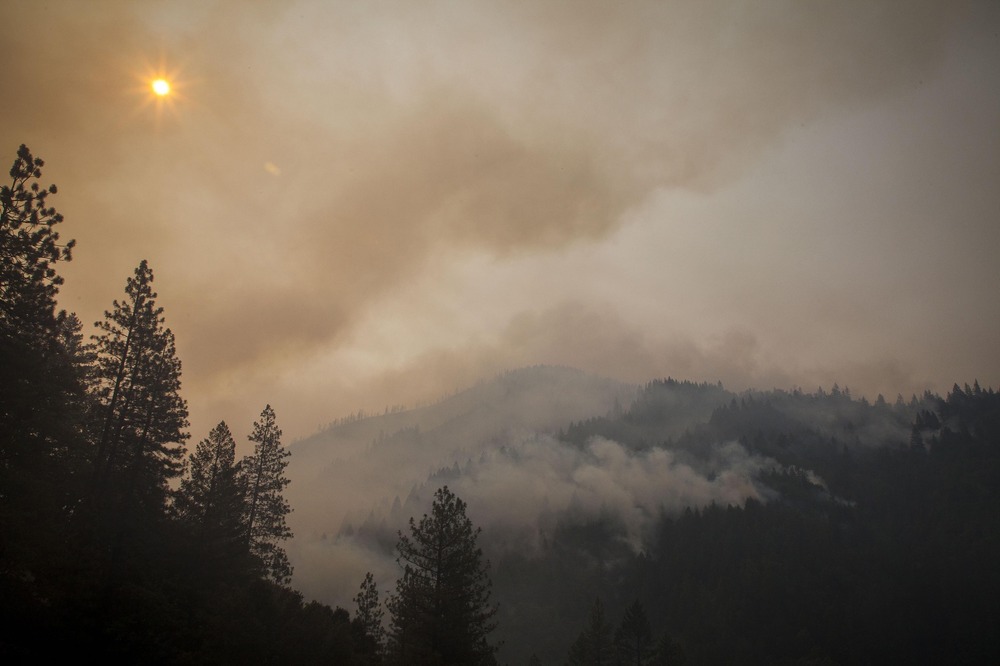
A file photo shows the sun peeking through the smoke and burned-out trees during the Carr Fire in the Whiskeytown Shasta-Trinity National Recreation Area near Redding, Calif. (OSV News/Kelly Jordan, USA TODAY NETWORK via Reuters)
For Catholics still discerning their 2024 U.S. presidential election vote, environmental issues may not be among their top concerns — but, say climate experts, they should be.
"Environmental issues are pro-life issues," said Chris Payne, an assistant professor of biology at Franciscan University of Steubenville in Ohio. "If we want to live our lives holistically pro-life, then we must recognize that our daily decisions and actions impact the lives of many throughout God's created world."
Approximately 37% of U.S. registered voters say climate change is important to them, according to a June 2024 survey by the Yale Program on Climate Change Communication.
Both presidential nominees have been outspoken on environmental issues, although not in the same way.
The Republican nominee, former President Donald J. Trump, gives a glance at his ecological aims in his platform via "Core Promises" signaling a shift in energy and environmental policy — such as, "Make America the dominant energy producer in the world" and "Cancel the electric vehicle mandate."
Trump has, however, caught more environmental attention for his frequent exclamations of "Drill, baby, drill!" emphasizing plans for increased fossil fuel extraction and use, regulatory rollbacks, and the downsizing of renewable energy policies — all designed, he has said, to reduce energy costs and increase American competitiveness.
"Genuine conservation efforts" are mentioned in the Republican Party platform, but other proposed environmental policies — like Trump's "Core Promises" — are predominately energy related.
Democratic presidential nominee Vice President Kamala Harris' campaign website likewise emphasizes energy policies, but also specifically mentions the climate crisis — promising to unite Americans on the issue, advance environmental justice, increase resilience to climate disasters, protect public lands and health, lower household energy costs, create clean energy jobs, and hold polluters accountable. These goals closely align with the Democratic Party platform, which also stresses America's role in global climate leadership.
"Both candidates have histories, certainly, on climate and environmental issues," said Catholic Climate Covenant executive director and founder Dan Misleh. Launched by the U.S. Conference of Catholic Bishops in 2006, the covenant is supported by more than 20 national partners.
"Those histories," Misleh emphasized, "are very, very different. President Trump pulled out of the Paris Agreement, and the Biden-Harris administration got back in."
The Paris Agreement is a legally binding international climate change treaty adopted by 196 Parties at the U.N. Climate Change Conference in Paris during December 2015. Signing countries pledge actions to reduce their greenhouse gas emissions, in an attempt to halt the march of warming temperatures across the globe.
According to the National Oceanic and Atmospheric Administration, 2023 was — by a wide margin — the warmest year since global records began in 1850. The United Nations reports that rising temperatures can cause more severe storms, increased drought, a warming and rising ocean, loss of species, famine and poverty, and health risks.
The Biden administration, Misleh noted, "also committed the largest investment in the history of the world into clean energy; into climate adaptation and mitigation; and into new environmental justice — whereas the Trump-Pence administration did none of those things, and kind of took us backwards a little bit."
Advertisement
Anna Johnson — North American senior programs manager for the Laudato Si' Movement, a global network of 900-plus Catholic organizations and over 10,000 trained grassroots leaders — echoed Pope Francis' urgent ecological message in his two environmental treatises, the encyclical Laudato Si' (2015) and the apostolic exhortation "Laudate Deum" (2023).
"Pope Francis wrote, a year ago, 'Laudate Deum' — and he says, 'The world in which we live is collapsing, and may be nearing the breaking point,'" Johnson noted. "And scientific facts that are coming out are just showing this to be increasingly true."
Recently released preliminary findings from a team of international researchers indicate the amount of carbon absorbed by land, trees and plants — a critical process to keep CO2 levels from rising — has temporarily collapsed, with almost no carbon absorbed in 2023. As NASA notes, "The more carbon dioxide they absorb during photosynthesis, the less carbon dioxide remains trapped in the atmosphere, where it can cause temperatures to rise."
For Johnson — who has witnessed climate impacts from the Philippines to Uganda to Guatemala and even the American heartland, where farmers say the growing seasons are changing and their tomatoes aren't ripening — such developments are more than just concerning. They're an active threat.
"These are terrifying, gut-wrenching scientific realities that have deep impacts upon all of humanity — everyone," she said. "From people living half a world away from me to our own children."
"There will definitely be environmental work done with (these candidates)," Johnson reflected. "I think it is urgently important that each Catholic take a deep look at each candidate's platform, and really discern what that level of work will look like, and how they see a viable future for us, and our children, and grandchildren living on this planet."
Misleh agreed, while noting that, of course, no candidate is perfect.
"I think the most important thing is that we learn the issues; we learn the candidates' positions on the issues; we look at the candidates' character, and history, and all of those things — and then go to the voting booth," advised Misleh. "Catholics are called to be deeply engaged in political life, because political life helps to promote — or not — the common good."
Caring for the environment, Payne observed, is intimately tied to a person's own humanity, as well as loving and serving God.
"Our being is made in the image of God — i.e., we universally share the vocation to love God, self, and neighbor so as to grow in relationship with God and become fully participatory in the love of the Trinity — and this vocation to love must be lived out in the context of loving relationship with the whole human family and all of Creation," he explained.
He pointed to an imperative found in the Catechism of the Catholic Church: "God created everything for man, but man in turn was created to serve and love God and to offer all creation back to him."
With this in mind, suggested Payne, "care for creation is simply one of many holistically pro-life ways to fulfill our vocation to love."
Payne was also clear that, while "the world is not going to blow up into a giant ball of fire," humans do bear responsibility for producing negative effects.
"We do have to recognize that evidence is clear that humans have had and continue to have global impacts on our world: climate, species, ecosystems and one another," said Payne. "Importantly, no matter what changes are occurring, the effects are and will continue to be felt first and foremost by the poor, whom we are called to have a special option for."
Ultimately, said Misleh, "there's so much we can do — as individuals; as families; as church communities — to help respect God's creation. ... We have to do that in our daily choices — in what we do; what we buy; what we eat. All of those things have impacts on the environment."
Those activities, said Misleh, extend beyond Nov. 5.
"Climate and environment policies are one issue that we need to bring to the voting booth — there are lots of others," he commented. "I would encourage people to understand Catholic social doctrine, and our Gospels — and bring that to the voting booth."







